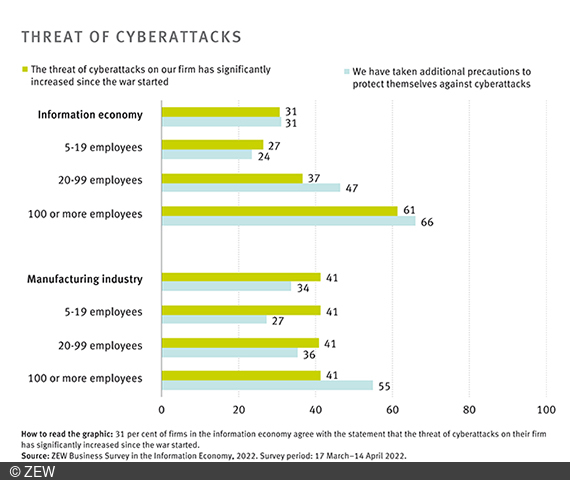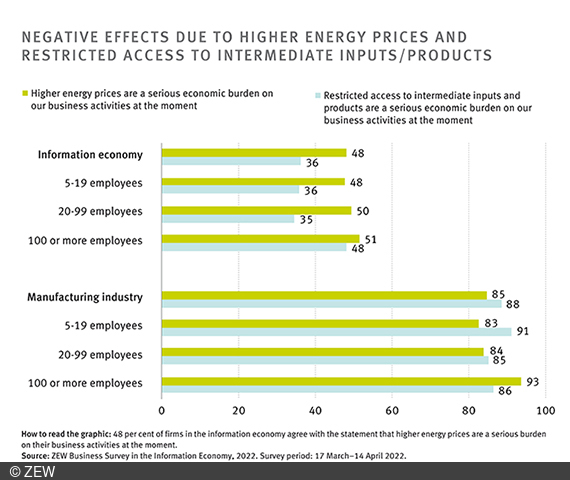German Firms Expect Increasing Threat of Cyberattacks
ResearchThe war in Ukraine poses major challenges for German firms. High energy prices, as well as restricted access to intermediate inputs and products impacts business activities, especially in the manufacturing industry. Larger firms in the information economy and manufacturing industry are preparing for the increasing threat of cyberattacks and have taken precautionary measures. These are the findings of a representative survey by ZEW Mannheim between 17 March and 14 April 2022 among approximately 700 firms in the manufacturing industry and information economy, including the ICT sector, media service providers and knowledge-intensive service providers.
Almost one in three firms in the information economy confirms that the threat of cyberattacks has significantly increased since the war started. Accordingly, the same number of firms has taken additional precautionary measures to protect themselves against these attacks. “Whether firms expect an increasing risk of cyberattacks and how often they take additional precautionary measures also depends on their size,” says Dr. Daniel Erdsiek, a researcher in ZEW’s “Digital Economy” Department. The larger the firm, the higher the expected risk of cyberattacks. Among the smaller firms with 5 to 19 employees, about one in four expects an increase in the threat of cyberattacks and therefore takes additional precautionary measures. By comparison, at least two out of three large firms with 100 or more employees agree with the statement that the threat of cyberattacks on their firm has increased significantly since the start of the war or that they have taken additional precautions since then.
Around 41 per cent of firms in the manufacturing industry also report a higher perceived risk of cyberattacks since the beginning of the war. So far, one in three firms in the manufacturing industry has taken additional precautions to protect themselves against cyberattacks. Here, too, the likelihood of taking additional precautionary measures also depends on the firm size: Among smaller firms with 5 to 19 employees, 27 per cent have taken additional precautionary measures. At 55 per cent, this figure is twice as high for firms with 100 or more employees.
Many suffer from high energy prices and supply chain disruptions
The vast majority of firms in the manufacturing industry faces negative consequences resulting from higher energy prices or limited access to intermediate inputs and products,” says ZEW research department head Professor Irene Bertschek. “In the manufacturing industry, 85 per cent of firms agree with the statement that higher energy prices are a serious economic burden on their business activities at the moment.” Firms with 100 or more employees were more likely to agree with this statement (93 per cent) than firms with 5 to 19 employees (83 per cent) and 20 to 99 employees (84 per cent). In terms of supply chain disruptions, 88 per cent of firms in the manufacturing industry confirmed that restricted access to intermediate inputs and products currently poses a serious economic burden on their operations. Smaller firms with 5 to 19 employees agree with this statement most often (91 per cent), compared to medium-sized and large firms (around 85 per cent).
Firms in the information economy, which primarily includes the services sector, also report to be negatively affected by higher energy prices or supply chain disruptions. Almost one in two firms in the information economy states that higher energy prices are currently a serious burden on their business activities. This figure is consistent among all firm sizes. In the survey, 36 per cent of all firms report that restricted access to intermediate inputs and products is currently severely affecting their business activities. This percentage is similar for small and medium-sized firms. In contrast, about every second larger company with 100 or more employees agrees that limited access to intermediate inputs and products is currently a serious burden on their business activities.


